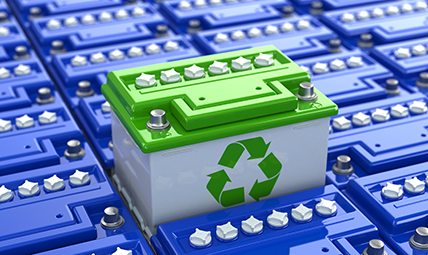Aurelius Environmental, part of Aurelius Holdings, and Dr Vasant Kumar from the Department of Materials Science and Metallurgy, have won a grant worth over 1.3 million Euros to develop a novel hydrometallurgical process.
The Horizon 2020 grant is available to high growth, innovative SMEs from all over Europe that want to disrupt the established value networks and existing markets. With the University of Cambridge as a partner and sub-contractor, Aurelius has been awarded the grant money under Phase 2 (Demonstration, Market Replication, R&D). Aurelius has received licensing support from Cambridge Enterprise, the University’s commercial arm.
Dr Athan Fox (Technology Director) said: “We believe in a fully sustainable business, where waste streams enter our processes and nothing but products leave; where multiple recycling infrastructures complement each other – one stream’s waste being another stream’s in-feed. Our journey towards this vision begins here, with a technology poised to revolutionise the recycling of lead-acid batteries.”
The key advantages of our hydrometallurgical process include a reduction in the carbon footprint – compared to smelting – by over 80%; virtually zero emissions of noxious gases like SO2 and NO2; and lead oxide produced directly from waste batteries.
Dr Athan Fox, Technology Director
Mr Miles Freeman (CEO), who is due to present at the 5th International Secondary Lead Conference in Kuala Lumpur, Malaysia (18–19 Sept 2017), says that the recycling of used lead-acid batteries is turning the corner to a “greener, cleaner and more sustainable process.”
“With the advent of new electrolysis-based processes coming from the USA and still under development within the EU, a new recycling era dawns. There is indeed the need for improvements in quality of secondary lead and for continued advancement in lead-acid battery technology to meet the ever-increasing demand for advanced electrochemical storage capacity,” said Mr Freeman. Aurelius has taken up a process that was originally pioneered by Dr Vasant Kumar et al. at Cambridge University. Industrialisation and commercialisation of the process is currently nine months into its development and a full-scale production capacity plant is expected to be operating by Q1 2018. The technology is exclusively licensed to Aurelius, with Dr Kumar and his research team collaborating with Aurelius to develop, industrialise and commercialise the process.
“The key advantages of our hydrometallurgical process include a reduction in the carbon footprint – compared to smelting – by over 80%; virtually zero emissions of noxious gases like SO2 and NO2; and lead oxide produced directly from waste batteries” said Dr Fox. “By producing lead oxide directly from spent batteries, we are effectively eliminating the need to oxidise lead ingot or to source lead metal from the open market. And that’s not all – studies conducted by Dr Kumar have shown that lead-acid batteries made from our proprietary paste can outperform primary source batteries in terms of both the energy density and battery life.”
Mr Freeman added: “The commercial viability of any alternative recycling process also faces challenges when compared to incumbent pyrometallurgical processes that, over years, have been well rehearsed, improved, and made very cost-efficient. We have therefore endeavoured to ensure that our process is not only environmentally cleaner, but also cheaper to run while making a superior end-product for lead-acid battery manufacture.”











